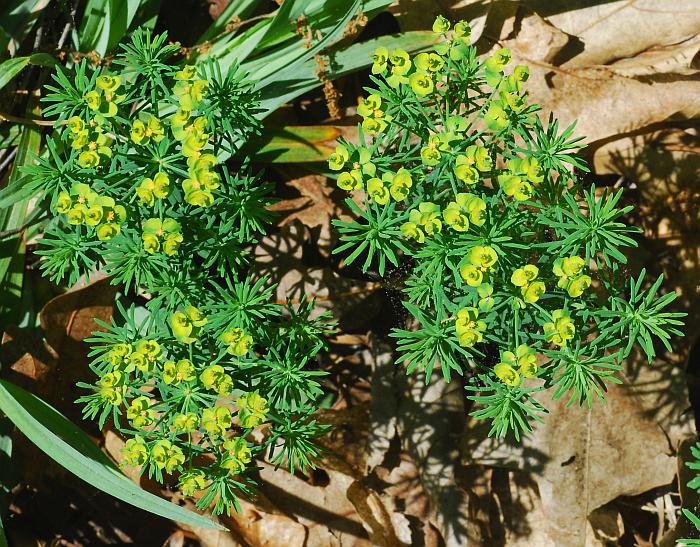Euphorbia cyparissias L.
Cypress Spurge

Introduced
CC = *
CW = 5
MOC = 20
© SRTurner
Euphorbia cyparissias L.Cypress Spurge | |
 |
Introduced CC = * CW = 5 MOC = 20 |
© SRTurner |
|
Family - Euphorbiaceae Habit - Perennial herb with a fleshy rootstock and usually rhizomes. Stems - Ascending to erect, to 40 cm, with milky sap, often with several short, densely leafy vegetative branches in the median and upper leaf axils, the branches not flattened toward the tip, usually green to yellowish green, sometimes reddish-or purplish-tinged toward the base, glabrous.
Leaves - Alternate, those of the inflorescence branches usually opposite, closely spaced and crowded. Leaf blades 10-30 mm long, unlobed, the margins entire, the surfaces glabrous, yellowish green to green. Stem leaves linear, entire, rounded or angled at the base, mostly angled or short-tapered to a sharply pointed tip. Inflorescence leaves dramatically different, bractlike, broadly ovate to nearly heart-shaped or somewhat kidney-shaped, rounded to cordate at the base, mostly broadly angled to a sharply pointed tip.
Inflorescences - Terminal umbels with a whorl of leaves at the base and with each of the up to 10 primary branches sometimes branched 1 or 2 additional times, the cyathia solitary at the branch tips. Inflorescence rays glabrous, the main ones to 2 cm long.
Flowers - Involucre 2-3 mm long, glabrous, the rim shallowly 4-lobed to nearly entire, the marginal glands 4, 0.8-1.3 mm long, crescent with each end appearing as a short, outward-curved horn, greenish yellow to yellow, lacking a petaloid appendage. Staminate flowers 15-25 per cyathium. Ovaries 3-locular, on a stalk to 1 mm long, glabrous, but the surface pebbled or minutely warty, the styles 0.5-1.0 mm long, each divided 1/5-1/4 of the way from the tip into 2 somewhat club-shaped lobes.
Fruits - Produced in relatively few cyathia, 2.5-3.0 mm long, glabrous but the surface pebbled or finely warty, especially toward the sutures. Seeds 1.5-2.0 mm long, oblong-elliptic in outline, nearly circular in cross-section, rounded or somewhat angled at the base, the surface smooth, grayish brown to silvery gray, with a small, nipplelike caruncle.
Flowering - April - August. Habitat - Cultivated and escaped to fields and roadsides, often around old homesites and cemeteries. Origin - Native to Europe. Lookalikes - E. virgata (which is often confused with E. esula). Other info. - This attractive species can be found cultivated throughout much of Missouri. Collections within the state are widely scattered and most probably represent previous cultivation or local escapes. The plant is readily identifed by general appearance; however, it could be confused with leafy spurge (E. virgata), a plant which is noxiously invasive in much of the northern U.S. and Canada. That species has been found in Missouri but is fortunately rare in the state. The two plants are easily distinguished by the leaves. In E. cyparissas these are small, narrow, and crowded, whereas in E. virgata they are larger, wider, and sparser along the stem. Since E. cyparissias rarely produces viable seed, it has remained relatively uncommon in the state. The plant grows easily from a rhizome cutting and requires little care once established. Photographs taken in Barry County, MO., 4-5-04 (DETenaglia); also at Danville Conservation Area, Montgomery County, MO, 4-28-2016 and 5-6-2017 (SRTurner). |